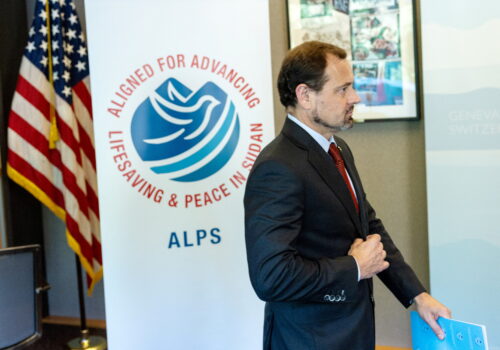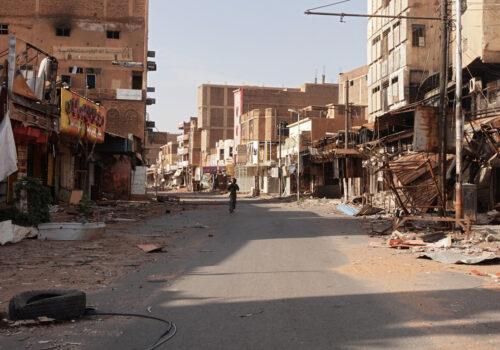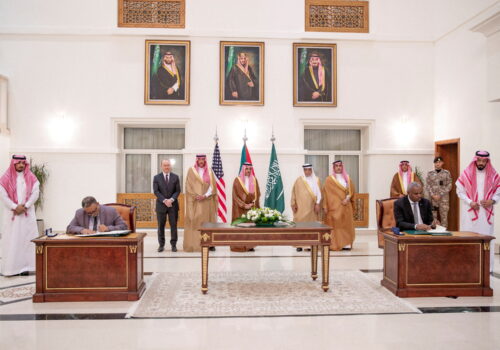Sudan is caught in a web of external interference. So why is an international response still lacking?
In a dramatic scene captured by mobile devices in November, Sudan Liberation Movement (SLM) rebels intercepted a convoy in Darfur’s barren desert. The footage shows fighters prying open crates under the harsh sun, revealing Kornet anti-tank missiles, ammunition, and combat equipment. The rebels denounce the United Arab Emirates (UAE) for allegedly arming the rival Rapid Support Forces (RSF). In another video, a fighter displays a Colombian passport with a UAE exit visa as evidence of the murky international web fueling Sudan’s escalating conflict.
This intercepted arms supply speaks to a broader reality: Sudan’s war is far from a contained domestic struggle. While often framed as a “civil war” between the Sudanese Armed Forces (SAF) and the RSF, it is instead shaped by extensive foreign interference that prolongs violence. While foreign actors help drive Sudan’s suffering, an international effort to bring an end to the war—and bring needed aid to the people of Sudan—has been lacking. Unraveling the web of outside interests is essential to cultivating an adequate international response to this crisis.
Although Abu Dhabi denies doing so, there is ample evidence that the UAE has been supplying weapons and ammunition to the RSF. Before the conflict erupted, Dubai was already a key destination for the RSF’s gold smuggling, providing financial lifelines to the militia. There are also reports of the UAE covertly providing weapons to the RSF under the guise of humanitarian aid, as well as UAE-manufactured armored vehicles outfitted with French-designed defense systems. The Colombian passport is evidence of international mercenaries’ deployment, a hallmark of UAE operations in other regional conflicts. The UAE’s support—combined with its investments in mining and agriculture—signals a calculated bid to shape Sudan’s political and economic trajectory. This interventionist strategy mirrors those employed by the UAE in Ethiopia’s Tigray conflict and in Libya, where Abu Dhabi expanded its influence through military aid and economic ventures.
SIGN UP FOR THIS WEEK IN THE MIDEAST NEWSLETTER
The Wagner Group, a Russian mercenary organization, provides another example of foreign interference. Active in Sudan since 2017, Wagner secured lucrative gold mining concessions in exchange for political and military support to Omar al-Bashir’s regime. Wagner evolved into a key player in Sudan’s war, funneling weapons and aid to the RSF. Moscow has also deepened ties with the SAF, offering military aid in exchange for a naval base at Port Sudan. Adding to this, Sudan has become a proxy battleground for the Russia-Ukraine war, with reports of Ukrainian special forces targeting Russian operatives over the past year. Together, these dynamics reflect Russia’s broader strategy in Africa: exploiting instability to expand influence while profiting from resources and military alliances.
While Russia and the UAE dominate headlines, Egypt, Turkey, and Saudi Arabia also shape Sudan’s conflict. Egypt, heavily dependent on Nile water security and historically aligned with Sudan’s military, cautiously supports the SAF as a counterweight to RSF-aligned actors. By providing military aid, Cairo seeks to protect its southern border and preserve regional influence while hosting diplomatic initiatives to facilitate ceasefires and a military-led transition in Sudan.
Turkey, meanwhile, has bolstered the SAF’s air capabilities. Following SAF chief Abdel Fattah al-Burhan’s visit to Turkey in late 2023, Cairo reportedly delivered Bayraktar TB2 drones to the SAF. These deliveries, partly enabled by the rapprochement between Egypt and Turkey, included training for Sudanese personnel in Egypt to operate the drones. This reflects Ankara’s broader strategy to expand its influence in the Horn of Africa and the Red Sea, leveraging defense and economic partnerships alongside infrastructure projects to strengthen its foothold in Sudan.
Meanwhile, Saudi Arabia focuses on stabilizing the Red Sea corridor, hosting peace talks in Jeddah, and emphasizing soft-power initiatives—such as Red Sea tourism projects—to counterbalance the UAE’s militarized strategy for influence and to secure strategic advantages and investment opportunities.
Other regional conflicts have also played a role in shaping the crisis in Sudan. For example, during Libya’s post-revolutionary era, Darfuri rebel groups served as mercenaries—mostly for General Khalifa Haftar’s Libyan National Army. Even after Sudan’s October 2020 ceasefire, Darfuri rebels remained in Libya, drawn by the steady flow of financing and supplies that made conflict more lucrative than peace.
Haftar—a key ally of Egypt, the UAE, and Russia—is leveraging Sudan’s instability to expand his own influence. While sporadically making headlines for covertly supporting the RSF, he mainly focuses on rerouting resource flows into Sudan, reaping economic dividends and political capital vis-à-vis his many backers. Since the conflict’s outbreak, Haftar has also used Sudan’s refugee crisis to attract international aid, positioning his government in eastern Libya as a necessary partner for migration and humanitarian assistance. By posing as a stabilizer, he has gained support while fueling the very crisis he perpetuates.
Chadian President Mahamat Idriss Déby employs a similar strategy. As Sudan’s war drives more than 700,000 refugees into Chad, Déby appeals for international aid, emphasizing the strain on host communities. He carefully navigates the rivalry between Russia and the West, deepening ties with both to extract concessions and support. At the same time, he offers the UAE plausible deniability for its role in Sudan’s war, securing military backing to shore up his position amid mounting pressures.
Porous borders between Sudan, Chad, and Libya—across which people, arms, fuel, and fighters move—further embed Sudan’s war within a larger network of regional instability. Unlike in Libya, whose oil sustains a tenuous power balance, Sudan’s zero-sum contest over resources—combined with deep ethnic and regional grievances—amplifies its complexity.
Yet amid this web of external interference, Sudanese military elites have continued to gamble their nation’s future for the fleeting promise of dominance, leaving devastation in their wake. Conservative estimates say that the war has killed more than twenty thousand people—with other estimates significantly higher—and displaced more than eleven million. Refugees fleeing RSF-controlled areas face extortion, sexual violence, and exploitation while neighboring countries such as Chad, Libya, and Egypt struggle to manage the influx. Organized crime, including human trafficking, thrives in the chaos, compounding the suffering of the displaced. Sudan now faces famine and economic collapse in contested areas, leaving millions more vulnerable and deepening the crisis.
Despite these dire consequences, the international response remains inadequate. Arms embargoes are routinely violated, and sanctions targeting groups such as Wagner have proven insufficient. A coordinated global approach is urgently needed to disrupt the illicit networks sustaining Sudan’s war. Sanctions targeting foreign companies that finance or equip warring factions—particularly through gold smuggling—could curb interference. Enforcement of the US Magnitsky Act, its European Union equivalent, and similar frameworks could address human rights violations tied to external actors. Financial tracking to freeze assets linked to illicit networks, alongside stricter enforcement of arms embargoes, is critical to stemming the flow of weapons and resources. Mobilizing the United Nations (UN) Human Rights Council and appointing a UN special rapporteur for Sudan could provide much-needed oversight and diplomatic momentum.
Addressing the humanitarian fallout is equally critical. Refugees and displaced persons require immediate assistance, and neighboring countries need financial and logistical support. However, aid must be managed carefully to avoid inadvertently bolstering the networks fueling Sudan’s suffering. Efforts to combat human trafficking and protect vulnerable populations must also be prioritized.
International efforts must go beyond rhetorical condemnations and piecemeal sanctions. A unified strategy, combining economic, political, and diplomatic pressure—and drawing on lessons from conflict zones such as Sierra Leone and Liberia—should target all actors violating arms embargoes and profiting from Sudan’s instability. The European Union and United States should jointly commit to exposing these networks, declassifying information on violations, and holding complicit states accountable through targeted sanctions and public admonishments. Imposing tangible costs on violators providing arms, smuggling resources, or exploiting Sudan’s humanitarian crisis would curb interference and set a precedent for accountability. Only a unified and decisive approach can disrupt the ambitions fueling Sudan’s suffering and prevent the region from descending further into chaos.
Emadeddin Badi is a nonresident senior fellow with the Middle East Programs at the Atlantic Council.
Further reading
Wed, Sep 25, 2024
Sudan has a famine. The gridlock on peace and security must end.
MENASource By
The international community’s continued fumbles to establish a durable solution to the humanitarian crisis in Sudan mirror its long-standing miscalculations in addressing its internal and regional geopolitics.
Tue, May 28, 2024
Sudan is an abject disaster. Is anyone listening?
AfricaSource By Benjamin Mossberg
US efforts in Sudan are not working. Additional visibility and attention can hopefully bring about solutions.
Wed, Apr 10, 2024
A diplomatic solution in Sudan demands greater US engagement with its Arab allies
MENASource By Manal Fatima
Halting external support to the generals is crucial to achieving peace in Sudan and setting it on the path to civilian-led rule.
Image: The satellite image shows IL-76 cargo planes on a tarmac at Amdjarass International Airport, Ouadi Koudjinli, Chad May 22, 2024. BlackSky/Handout via REUTERS THIS IMAGE HAS BEEN SUPPLIED BY A THIRD PARTY. NO RESALES. NO ARCHIVES


